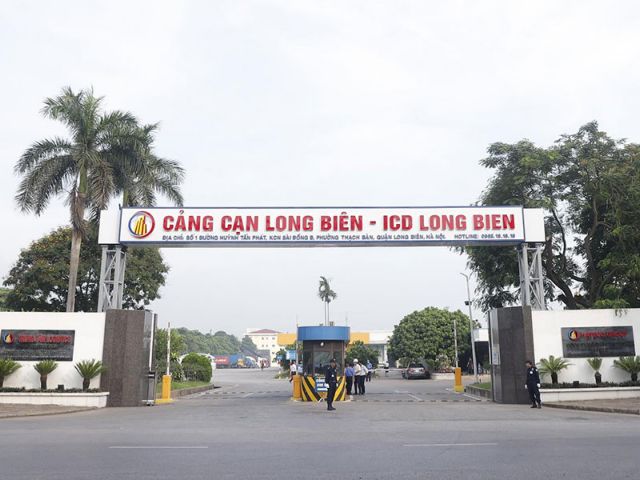
HÀ NỘI — Hà Nội plans to turn the Long Biên inland container depot (ICD) into a modern logistics centre with a complete chain to meet the increasing demand for logistics services.
A representative of Hateco, the investor and operator of Long Biên ICD, said this dry port has a total area of 120,000 sq.m operating 24/7 with a capacity of receiving more than 100 container trucks at the same time. It has warehouses, a distribution centre for goods and an express delivery centre.
The Long Biên ICD is also recognised as a customs clearance location for export and import of goods. Imported goods will be transported directly to Long Biên ICD and open declarations to help businesses save time, optimise costs, reduce contact points and congestion at seaports.
Accordingly, goods are imported through international road border gates, international railway stations, international airports and seaports and then transferred from the border gate to Long Biên ICD for customs clearance. They are goods on the list of imported goods subject to customs procedures at the import border gate, excluding aircraft, yachts; gasoline; explosive precursors and industrial explosives.
The Ministry of Finance said with a convenient location for traffic, Long Biên ICD connects to a system of seaports, airports, and land border gates from north to south and is located 100km from Hải Phòng port, 122km from Lạch Huyện port, 26km from Nội Bài International Airport, and 126km from the Chinese border.
It is also a gateway to key industrial zones in the North with convenient traffic and is easy to connect with many northern provinces and cities such as Hưng Yên, Hải Dương, Hải Phòng, Bắc Ninh, Quảng Ninh and Thái Nguyên.
This will be a lever to reduce pressure on seaports and border gates, turning Long Biên ICD into a centralised point for handling all logistics services according to the needs of businesses.
According to the Vietnam Logistics Business Association (VLA), in recent years the logistics industry growth rate has reached about 14-16 per cent to US$20-22 billion per year, accounting for nearly 20.9 per cent of the national GDP.
Despite the high growth rate, logistics costs account for a large proportion in the product cost structure. For example, Chairman of Minh Phú Group Lê Văn Quảng said that transporting a container from Việt Nam to Japan costs VNĐ16 million, but from HCM City to Hà Nội costs VNĐ80 million.
Logistics is one of the factors that determines the import and export competitiveness of Việt Nam. Therefore, if logistics services including warehousing, order processing and transportation, are not linked, costs will increase, affecting the competitiveness of enterprises.
With complete infrastructure and diversified services at the Long Biên ICD, businesses distributing high-value goods, cross-border e-commerce goods and raw materials such as high-end fashion, cosmetics, production accessories and plastic resins will reduce logistics costs.
This is also the premise for Hateco to develop cross-border e-commerce logistics and retail services. VNS
Xem thêm: lmth.ertnec-scitsigol-nredom-a-evah-ot-ion-ah/932749/ymonoce/nv.swenmanteiv